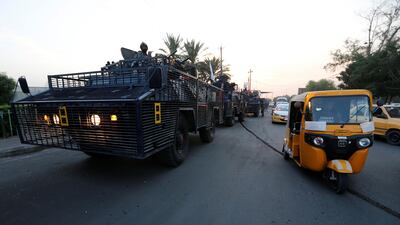Iraqi police were questioned on Sunday after 21 prisoners escaped from jail, the latest breakout to highlight failings in the country's security system.
Ten of the escaped prisoners, all convicted on drug and terrorism charges, had been recaptured by Sunday afternoon, after a manhunt was launched at dawn.
Interior minister Othman Al Ghanmi immediately "ordered the confinement to the barracks of all officers and police" at Hilal district prison in Muthanna province, 300 kilometres south of the capital Baghdad, while an investigation was carried out.
It was not immediately clear how the prisoners broke out, but in corruption-riddled Iraq, escapes are often achieved by paying off security forces.
Other detainees get help from armed groups and tribes, often equipped with heavy arms.
Anti-corruption civil society organisation Transparency International ranks Iraq 21st from bottom in its Corruption Perceptions Index.
In mid-March, men from a powerful pro-Iran armed group disguised as soldiers freed a drug trafficker under police escort while en route to court in Amara, another town in rural southern Iraq.
In an effort to flush out the escapees and discourage accomplices from sheltering them, Muthanna's governor promised "a financial reward to anyone who catches a fugitive", while law enforcement officers enlisted the help of tribal leaders in the manhunt.
Prison breaks are particularly sensitive in Iraq, where thousands of Iraqis and foreigners have been convicted of terrorism, mainly as part of ISIS in recent years.
Extremist groups, including ISIS and Al Qaeda, have organised escapes from Iraqi prisons, and vow to carry out others.
Iraq is regularly criticised by human rights activists for the conditions of its jails.
Cells built to hold around 20 detainees are often packed with 50, a source working in the jails said.
Prisoners are often caught smuggling phones or passing on information during family visits.

